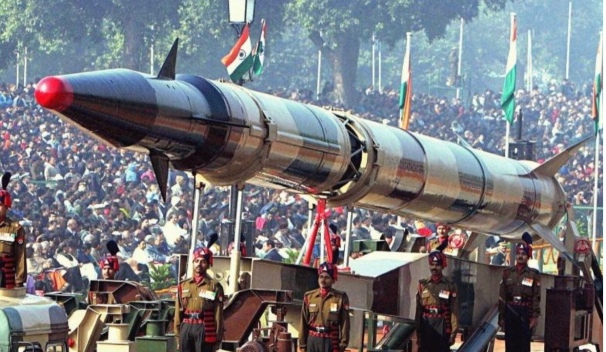
Pakistan predicts Indian ‘false flag’ attack that triggers face-off with ‘nuclear-armed countries’
by Joel Gehrke | August 22, 2019 07:24 PM
Pakistani Prime Minister Imran Khan raised the prospect of nuclear war with India while calling for international assistance in a territorial dispute with his larger democratic neighbor.
“My worry is that this can escalate and for two nuclear-armed countries, it should be alarming for the world what we are facing now,” Khan warned.
Khan invoked their respective weapons of mass destruction twice, stoking alarm over the arsenals that make the question of who controls the border region of Kashmir one of the “most dangerous” controversies in the world. Indian Prime Minister Narendra Modi tightened his government’s control over the Indian-held portion of Kashmir, arguing that the changes would enhance security in an area simmering with terrorism threats, but Khan suggested that New Delhi is preparing a “false-flag operation” to justify a military conflict with his country.
“And then you are looking at two nuclear-armed countries eyeball to eyeball, and anything can happen,” Khan told the New York Times in an interview published late Wednesday.
The two rivals clashed in February, when Indian fighter jets crossed the unofficial boundary dividing the Indian and Pakistani-controlled portions of Kashmir to strike a terrorist group in Pakistan. One of India’s Soviet-made MiG-21s was downed by the Pakistani air force, and the pilot was captured. But U.S. officials sided with India in that incident because of frustration over Pakistan’s perceived willingness to allow the terrorist networks to operate with impunity.
“Khan has been attempting to turn the tables on India, and characterize it as the malevolent force in the region, while in fact Pakistan is the country that has used terrorism as the primary tool in its foreign policy,” Bill Roggio, a senior fellow at the Foundation for Defense of Democracies, told the Washington Examiner.
Modi echoed those charges when he revoked Jammu and Kashmir’s special status earlier this month on the grounds that “terrorism and separatism” had flourished in the area and that the territory’s autonomy “used as a weapon by Pakistan to incite anti-national feelings against some people in our country.”
President Trump sided with Modi implicitly in the wake of the administrative change, despite Khan’s allegations that India is planning an “ethnic cleansing.” But India’s tactics in locking down the Muslim-majority region — the government has cut internet access and used pellet guns to enforce a curfew — is beginning to draw criticism from American leaders.
“There are legitimate concerns about the ongoing communications blackouts, increased militarization of the region, and enforcement of curfews,” House Armed Services Chairman Adam Smith, a Washington Democrat, said Wednesday. “This policy decision exacerbates an already tense environment in the region. I encourage both India and Pakistan to keep lines of communication open to prevent the further deterioration of the situation, and exercise restraint instead of engaging in rhetoric and actions that inspire extremist ideology.”
Khan argued that India has rejected his attempts to have a productive discussion of the issue, which Indian authorities maintain is a purely internal matter. “There is no point in talking to them,” he said. “All the overtures that I was making for peace and dialogue, I think they took it for appeasement.”
But Roggio, who monitors terrorist groups headquartered in Pakistan as editor of the FDD’s Long War Journal, views Khan’s complaint with suspicion. “I do not think Khan is sincere about this,” he told the Washington Examiner.
“I do not think Khan is sincere about this,” Roggio said. “He is laying the groundwork for plausible deniability for the next attack in India that is carried out by one of Pakistan’s jihadist proxies.”
No comments:
Post a Comment